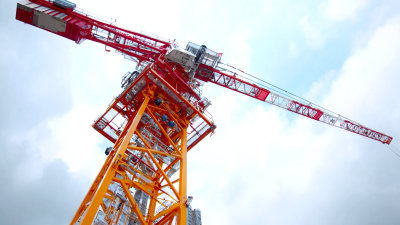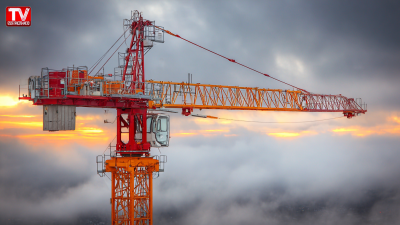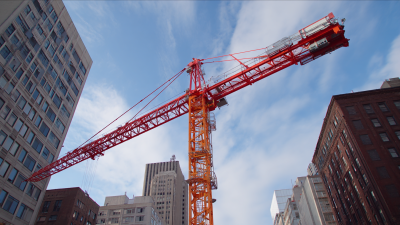The demand for skilled professionals in the construction industry, particularly for Tower Crane Jobs, has seen a significant rise over the past decade. According to a report by the Occupational Outlook Handbook, employment of construction laborers and helpers is projected to grow 8% from 2020 to 2030, indicating a robust job market influenced by the increasing need for infrastructure development and urban housing. As cities expand and projects become more complex, the role of the tower crane operator is essential to ensure efficiency and safety on construction sites. Staying ahead of industry trends, such as the integration of technology and automation in construction equipment, along with mastering essential skills like load management and crane safety protocols, can dramatically enhance a candidate’s competitiveness in securing these coveted positions. In this article, we will explore strategies to effectively navigate the evolving landscape of tower crane employment opportunities.

The tower crane rental market is experiencing significant growth, with projections estimating it will reach USD 22.1 billion by 2030. This trend is driven by the increasing demand for construction projects globally, particularly in urban areas where space is limited and vertical construction becomes essential. As the industry evolves, there is a heightened need for skilled tower crane operators who can efficiently manage these powerful machines and contribute to the timely completion of projects.
Understanding the current demand for tower crane operators is crucial for those looking to secure jobs in this competitive field. Key industry insights show that operators with specialized training, certifications, and a strong grasp of safety regulations are highly sought after. Moreover, staying updated with technological advancements in crane operations can give aspiring operators a competitive edge. As the construction landscape continues to change, aligning one's skill set with industry trends is vital for long-term career success in this booming market.
To secure a job as a tower crane operator, it is crucial to focus on essential skills that emphasize both technical proficiency and safety compliance. Proficiency in operating crane equipment requires a deep understanding of load management, equipment mechanics, and crane controls. Aspiring operators must also engage in extensive training programs, including obtaining relevant certifications, to demonstrate their capability to handle complex lifting tasks effectively.
Safety compliance is equally critical in the crane operation industry. Recent reports indicate an alarming rise in crane-related injuries, with eight incidents documented over two years, highlighting poor adherence to safety protocols at high-rise construction sites. This trend underscores the dire need for operators to prioritize safety practices, such as conducting thorough pre-operation checks and adhering to established safety guidelines. Both technical skills and a commitment to safety will not only enhance an operator's employability but also contribute to a safer work environment, ultimately benefiting the industry as a whole.
Networking is crucial for securing tower crane jobs in the fast-evolving construction industry. According to the Bureau of Labor Statistics, employment of crane operators is projected to grow by 6% from 2020 to 2030, highlighting the increasing demand for skilled professionals. Building connections within the crane industry can provide aspiring crane operators with valuable insights into job openings and emerging trends. Engaging in industry forums, attending construction expos, and joining professional organizations such as the National Commission for the Certification of Crane Operators (NCCCO) can enhance your visibility and credibility among peers and employers.
Moreover, industry reports suggest that professionals who actively network and participate in skill development workshops gain a competitive edge. A survey conducted by the Associated General Contractors of America revealed that 61% of construction firms reported difficulties in finding qualified workers, emphasizing the need for specialized skills and effective networking. By connecting with experienced operators and industry leaders, individuals can tap into mentorship opportunities, share knowledge about best practices, and stay informed about technological advancements in crane operation. This proactive approach not only bolsters your resume but also fosters long-lasting professional relationships that can lead to job referrals and collaborative opportunities in the future.

In today's fast-evolving construction landscape, crane operations are experiencing significant changes driven by automation and technological advancements. The adoption of automated cranes and remote operation technologies is reshaping the way projects are executed, enhancing efficiency and safety. Operators must stay updated with these trends to remain competitive in the job market. Understanding the intricacies of automated systems, from programming to troubleshooting, is becoming essential for aspiring crane operators.
Moreover, technological advancements such as data analytics and virtual reality training are revolutionizing skill development in the industry. Employers increasingly seek candidates who can leverage these tools to optimize crane performance and improve project outcomes. As automation takes center stage, professionals with a robust grasp of these technologies will find themselves more appealing to potential employers. Engaging in continuous learning and practical experience with modern technologies can set candidates apart in securing desirable tower crane positions.

To secure a position as a tower crane operator, obtaining relevant certifications and completing training programs can significantly enhance employability in this competitive field. Many employers prefer candidates who have undergone formal training, ensuring they possess a comprehensive understanding of crane operations, safety protocols, and emergency procedures. Certification from recognized organizations, such as the National Commission for the Certification of Crane Operators (NCCCO), validates a candidate’s skills and knowledge, setting them apart from those without certification.
In addition to certification, specialized training programs can provide aspiring tower crane operators with practical experience and up-to-date industry knowledge. These programs often cover essential topics such as load management, rigging techniques, and site safety regulations. Engaging in hands-on training enables individuals to develop the technical skills necessary for effective crane operation, which is crucial for safely navigating various job sites. With the combined benefits of formal certification and targeted training, candidates are better equipped to meet industry demands and secure lucrative job opportunities in the tower crane sector.






